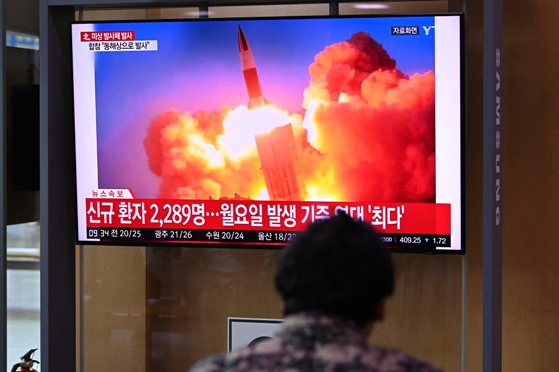North Korea launches short-range missile as country’s envoy speaks at UN
By Choe Sang Hun
SEOUL— North Korea fired a short-range missile off its east coast Tuesday (28), the South Korean military said, just as the North’s ambassador to the United Nations called on the United States to end joint military exercises and withdraw its strategic weapons from around the Korean Peninsula.
The North resumed short-range ballistic missile tests after its negotiations with the Trump administration collapsed in 2019. Pyongyang conducted its last missile tests on Sept. 15, when it launched two ballistic missiles in violation of multiple UN Security Council resolutions banning the country from developing or testing ballistic missiles or nuclear devices.
North Korea’s short-range missiles are not treated with as much alarm as the country’s intercontinental ballistic missiles. It was not clear whether the test Tuesday involved a ballistic missile, which would violate the UN resolutions.
The missile launch Tuesday morning came three days after the sister of Kim Jong-un, the North’s leader, said Saturday (25) that the country would consider holding a summit meeting with South Korea and declaring an official end to the Korean War if the South could restore trust with Pyongyang.
The statement from the sister, Kim Yo-jong, had raised cautious hopes that North Korea might be ready to resume dialogue, 2 1/2 years after Kim Jong-un’s diplomacy with President Donald Trump fell apart without an agreement on ending the North’s nuclear weapons programs or the lifting of sanctions.
Speaking to the UN General Assembly, the North’s ambassador, Kim Song, reiterated that Washington must end “hostile policy” toward his country if it wants peace on the peninsula. The Korean War was halted in a truce in 1953, leaving the peninsula technically in a state of war.
“If the US wants to see the Korean War, the most prolonged and long-lasting war in the world, come to an end, and if it is really desirous of peace and reconciliation on the Korean Peninsula, it should take the first step towards giving up its hostile policy,” Kim, the ambassador, said.
“Hostile policy” is usually a reference to US joint military drills with South Korea, the US military presence on the peninsula and the UN sanctions imposed on the North over its nuclear weapons and ballistic missile development.
The first step in negotiations, Kim added, includes “stopping permanently the joint military exercises and the deployment of all kinds of strategic weapons” in and around the peninsula.
Washington has repeatedly urged the North to return to nuclear disarmament talks, saying it has no hostile intent against the isolated, impoverished country.
But North Korea has yet to respond to the Biden administration’s proposal that talks resume anytime, anywhere “without preconditions.”
North Korea has long said that its nuclear arsenal is for self-defence and has complained about the joint military exercises for decades, countering them with its own military drills, often with weapons tests. Washington and Seoul insist that the joint exercises, a centrepiece of their military alliance, are defensive in nature, and have largely dismissed North Korea’s complaint as propaganda.
As he engaged Kim Jong-un in diplomacy, Trump cancelled or scaled back the exercises to help facilitate the negotiations. He said that the joint “war games” were “provocative” and too “expensive,” but critics accused him of turning the military drills into a bargaining chip.
The cancellation of the joint drills by Trump also delayed South Korea’s preparations to build up its defence capabilities as part of a long-term effort to regain wartime operational control of its own military. Wartime operational control of the South Korean military has been in the hands of US generals since the 1950-53 Korean War.
Talks between Kim and Trump collapsed when North Korea demanded that Washington lift all of the most biting UN sanctions in return for a partial dismantling of its nuclear weapons program.
Trump rejected Kim’s offer, insisting on a quicker and more comprehensive rollback of the North’s nuclear program.
On Monday (27) evening at the United Nations, Kim, the North’s envoy, said that his country would persist on its nuclear program.
“Given that the US and the US-South Korea military alliance increase military threats against the DPRK, nobody can deny the righteous right to self-defence for the DPRK to develop, test, manufacture and possess the weapon systems equivalent to the ones which are possessed or being developed by them,” said Kim, using the abbreviation for his country’s official name, the Democratic People’s Republic of Korea.
-New York Times


